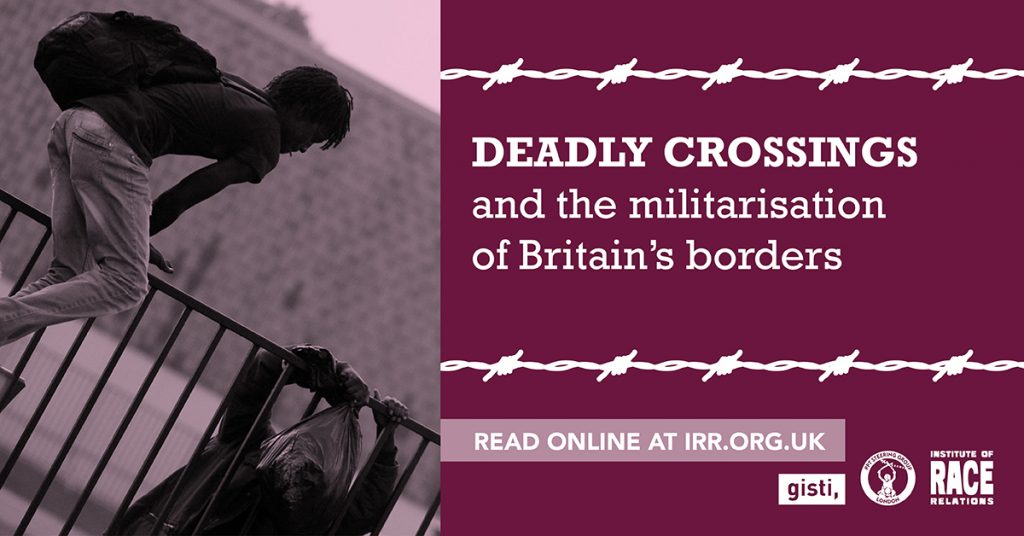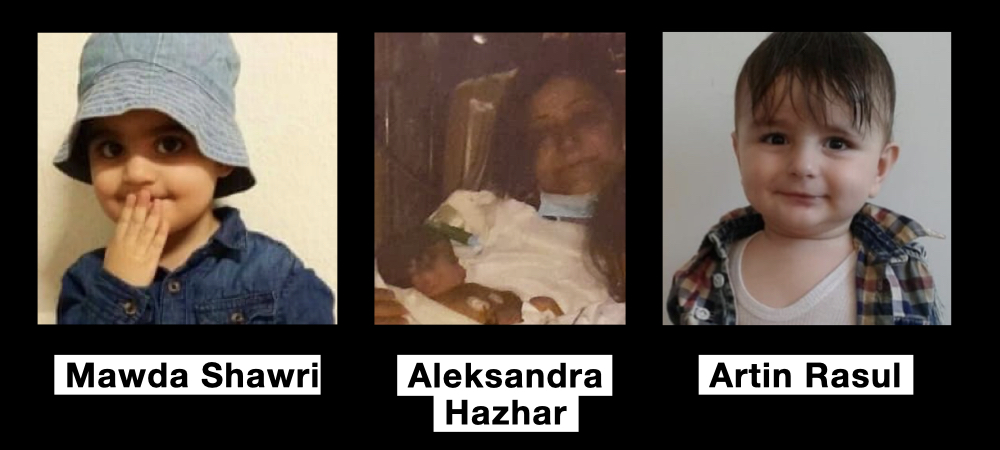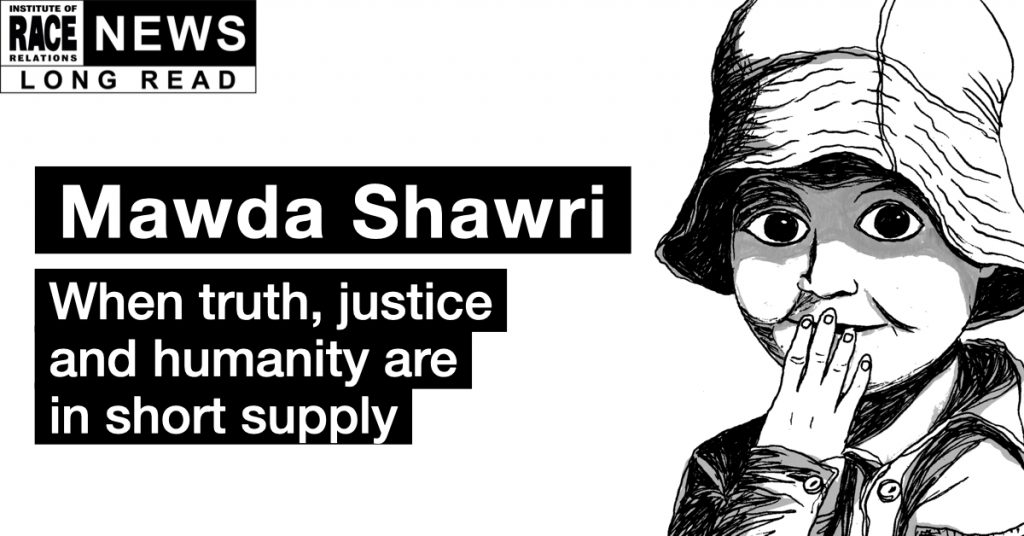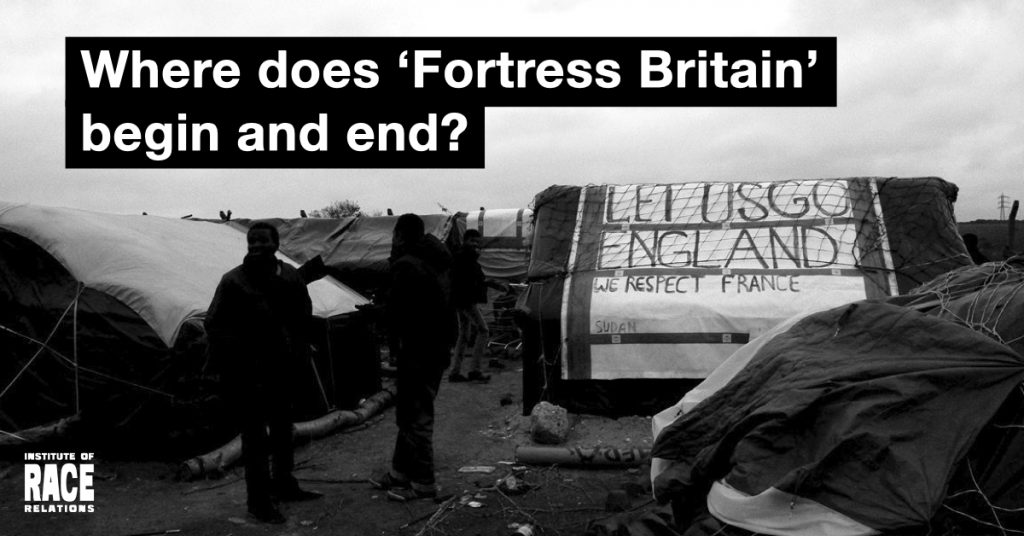IRR’s Anya Edmond-Pettitt along with GISTI’s Maël Galisson and Frances Timberlake from Refugee Women’s Centre & Refugee Rights Europe continue our investigation into migrant deaths at the UK borders, pointing to UK complicity in deaths on the Continent, including the tragic loss of life of infants Artin Rasul, Mawda Shawri and Aleksandra Hazhar.
On 7 June 2021, yet another death among those crossing the Channel was confirmed. After months of being missing, 15-month-old Artin was finally confirmed dead by Norwegian police. His body washed ashore near Karmøy, south-west Norway on New Year’s Day and was positively identified through DNA comparisons. Artin and his family died in October 2020 when the small fishing boat they were travelling in came into difficulty in high winds, making national headlines. Of the 28 people on board, 19 died, including Artin’s parents Rasul Iran Nezhad and Shiva Mohammad Panahi, both 35, and his brother and sister: Armin, 6, and Anita, 9.
We can attribute Artin’s death, those of his family members, all who travelled with them, and the 40,555 other deaths (collected by UNITED) to ‘fatal policies of Fortress Europe’ between 1993 and 2020. These deaths are neither unavoidable nor inevitable; rather, they are the product of governmental policies that renounce those attempting to seek refuge in Europe. Yet despite these horrific numbers, EU member states continue to pursue punitive migration management and border security policies, at any cost. Between 2013 and 2020 securitisation efforts by the EU amounted to €13 billion, and they are expected to reach €34.9 billion for the 2021-27 period.
Counting and accounting – an act of resistance
In the face of state violence against displaced people and the deadly consequences, naming and remembering the dead is an act of resistance. Over the years, civil society organisations have documented deaths related to immigration and border regimes throughout Europe. However, until recently, the majority of this monitoring work focused on the Mediterranean with deaths at the EU’s internal borders being a blind-spot, despite the fact that between 1999 and May 2021, at least 302 people died trying to cross the French-British border. However, these deaths have been routinely blotted out and forgotten by states and, in the unlikely event a death does gain media attention, it is presented as a singular incident rather than a direct and routine result of current immigration policies. The aim in collecting as much detail about the lives of those who die seeking safety in Britain is to give an identity and a history to these otherwise unaccounted for lives. It provides a space to ensure the individual is remembered as such and not simply as a statistic, but also calls for authorities to be held accountable and state policies changed.

The cycle of criminalisation
In Calais and the surrounding region, displaced people face a cycle of violence and rights violations, predominantly enacted by police forces. At the Franco-UK border, the French government has long attempted to make invisible and suppress the displaced population transiting through the country, a policy fully supported and funded by the UK through a series of bilateral agreements. Two of these, the Sangatte and Le Touquet treaties, place British border control well into French territory and reciprocally, French control is extended to Kent. This creates a geographical expansion of the UK’s Hostile Environment with the aim to deter and deflect people from the border.
Imposing a heavily militarised border aligns with the French objective of avoiding ‘points of fixation’ in the northern coastal region and UK desire to prevent irregular arrivals. The UK has financed the securitisation with the purchase of surveillance cameras, truck-scanning technology and barbed wire throughout the area, with sums exceeding £300 million in recent years thereby creating a ‘Fortress Britain’ within the bounds of ‘Fortress Europe’. This has allowed the French government, on its part, to deploy Gendarmes and CRS officers en masse to make the coastal zone as unliveable as possible for asylum seekers.
France and the UK legitimise the huge expense of this harsh border enforcement through framing irregular crossings as attacks on national safety, and dehumanising those that make such crossings by reducing them to dangerous threats. Consequently, any crossing, even those resulting in death, can be used as an excuse to further reinforce security. A narrative that creates a vicious circle of ever more punitive policies. It is the restrictive border and immigration controls that force people into irregular crossings, which criminalises them, that in turn further justifies the reinforcement of immigration controls. With no alternative, those attempting to cross are trapped in a state of self-perpetuating criminalisation. The enforcement of a hostile environment, that criminalises crossings throughout the border region, creates a zone in which death is an accepted by-product.
Police violence at the core
The conjunction of state policies and media narratives that dehumanise people attempting to irregularly cross the border, creates an environment where police have wide discretion in their use of force against those without papers. Indeed, police powers are at the heart of the systemic violence against those hoping to reach the United Kingdom. In fact, police participation in the regime of generalised violence against foreigners has led to direct involvement in the deaths of displaced people. On 19 November 2020, Mohamed Khamisse Zakaria, a 20-year-old Sudanese man, tried to hide in a lorry trailer during a traffic jam on the A16 motorway access ramp to the Channel Tunnel. The police intervened and began firing tear gas. Attempting to escape the gas, Mohamed was hit by an overtaking car. He died shortly after the arrival of emergency services. A similar scenario occurred on 29 January 2018 on the E40 motorway at the Jabbeke service area in Belgium. While trying to get into the trailer of a truck, a 40-year-old Ethiopian man was spotted by a police patrol. Chased by police dogs and their handlers, the man fled towards the main roads and was hit by a vehicle.
Such violence is well known and has been widely condemned. Displaced people, No Border activists, local and national associations, even international NGOs have all produced reports and testimony. For example, Human Rights Watch, twice (in 2015 and 2017) drew attention to the police treatment of migrants in the Calais region. Additionally, in reports published in 2012 and 2015, the French national rights defender severely criticised the actions of the police. Similar concerns have been raised by the United Nations Human Rights Committee and the Council of Europe’s Commissioner for Human Rights, who noted ‘humiliating police practices, destruction of humanitarian donations and personal belongings and expulsions of migrants from their shelters carried out outside any legal framework’.
Despite all this, these practices have rarely been subject to either regulation or accountability. Formal complaints and legal processes have been largely unsuccessful, even when the violence has resulted in death. Blame is placed with migrants themselves whilst removing responsibility from the police, policing tactics and the state.
Police acquitted and victims condemned
Artin is not the first infant to die seeking safety in Europe, most famously there has been Alan Kurdi in 2015 but more recently Mawda Shawri and Aleksandra Hazhar fell victim to the police’s discretionary violence in Belgium and France. Mawda was only two years old when she was shot dead, hit with a bullet shot by a policeman at the window of the van she was travelling in during a pursuit in May 2018. The bullet struck her in the upper cheek. The family sought justice through the courts, and the trial’s verdict was finally heard in February 2021.
Aleksandra died three days after being born prematurely by emergency caesarean following her mother, Rupak, being held on a cold beach by Gendarmes for attempting to board an inflatable boat, in September 2020. During the long wait, Rupak’s waters broke and she began to bleed. According to the family’s testimony, only once she and her family were released hours later were they able to call an ambulance. Following this, Aleksandra’s parents filed an official complaint in February 2021 alleging that police forces were responsible for her death.
In both the cases of Mawda and Aleksandra, Belgium and France appeared to shift responsibility for their deaths to the families, accusing them of endangering their children’s lives. Following the complaint filed by Aleksandra’s parents stating police violence and ‘non-assistance to persons in danger’ led to the death of their daughter, the préfet of the Pas-de-Calais region issued a press release to absolve the police of blame. The communiqué asserts that during the family’s wait on the beach ‘not one of the migrants reported any particular difficulties’ contradicting entirely the parents’ version of events. It goes so far as to say that ‘This particularly sad event shows how dangerous it is to attempt to cross the Channel in makeshift boats.’

Two years earlier, immediately following the death of Mawda, the Belgian police force similarly attempted to contradict and discredit her family and those travelling with them. Their narrative in the immediate aftermath suggested that Mawda died during the pursuit after being used as a ‘human shield’, a presumption since shown to be entirely false. An officer’s account of the incident stated: ‘During the chase […] they break the windows with the head of a child, and they pretend to throw it out towards the police cars. The blows the child received result in a head injury and the death of the child.’ This version of events, originally endorsed by the Mons Crown Prosecution, who would later play a major part in the investigations and trial, relies on and reinforces the trope of the reckless ‘illegal migrant’.
A trope that was borne out fully in the treatment of those accompanying Mawda’s family, during the legal proceedings. The court chose to split what would normally have been a single trial into two for the alleged van driver and smuggler, both young Kurdish Iraqi men. The first trial was to establish responsibility for the death of Mawda and the second for smuggling charges but still with an ‘aggravating factor of death’. The two young men therefore faced double punishment for a single incident in which there was scant evidence of their involvement.
The first trial saw the policeman responsible for the shooting of Mawda receive a one-year suspended sentence for involuntary homicide. The gunshot was judged to have been a mistake caused by the van driver swerving towards the police car. This alleged swerve, however, resulted in a four-year sentence for the alleged driver for ‘malicious traffic obstruction’ and ‘armed rebellion’. So, a young Kurdish-Iraqi man was made to bear the legal and moral weight of Mawda’s death, whilst the policeman, who has since appealed against his sentence, may walk free. State actors have succeeded in excusing police action by peddling an anti-trafficking discourse that deflects the blame onto migrants accused of facilitating irregular journeys.

Death as deterrence
Authorities shift attention from the behaviour of law-and-order forces to the ‘migrants’ by framing them as ‘dangerous criminals’, ‘illegal facilitators’ or ‘human traffickers’ − a framing easily achieved due to the numerous laws providing heavy sentences related to unauthorised border crossings that are actively enforced to dissuade against any future crossings. Similarly, aggressive policing is used to deter unauthorised movement. Around Calais, there are frequent allegations made of police holding people for extended periods following intercepted boat crossings; detaining people in CRAs [detention centres] or leaving families wet and cold in isolated areas, as experienced by Aleksandra’s family. The police’s alleged refusal to call an ambulance for this family, despite their requests for help and the long time they were forced to wait on the beach, underline the logic of deterrence now commonplace in this border zone.
However, despite the aim of making the laws against irregular border crossing excessively punitive, governments argue they are necessary to ‘save lives’ from the ‘dangerous criminal’ and/or the dangerous crossing. This argument, seen clearly in the UK Home Secretary Priti Patel’s response to the death of Artin’s family in October 2020, is used to justify the ever-increasing funding deployed for policing, security and surveillance. She stated in the immediate aftermath of the tragedy: ‘I will do everything I can to stop callous criminals exploiting vulnerable people’. A message backed up by a pledge of €31.4 million from the UK to ‘tackle migrant activity in the Channel’, including French coastal police patrols.
The horrifying irony is that it is this law-and-order approach that pushes people to take ever greater risks and more perilous journeys, including via smugglers. Therefore, the policing of unauthorised immigration operates in a self-perpetuating cycle: unregulated, hostile forms of policing provoke death at the border, which in turn become moments that reinforce and legitimise harsher policing methods and crime sentencing. As fatalities increase, so do governments’ justifications to ramp up security. Artin, Mawda and Aleksandra’s deaths are some particularly horrifying culminations of the logic deeply embedded and daily enacted across the UK border zones for over thirty years. Its production of violence and death is then absorbed in the legal and political systems to produce harsher policies that produce more violence and death. Justice for all those affected will not be achieved by reinvesting in the established modes of recourse, but rather in fighting for and funding an alternative form of refuge for the displaced and the desperate that provides dignity and humanity.
Related Links
Read more about the deadly immigration policies in the Channel: Deadly Crossings and the militarisation of Britain’s borders
Read more about the case of Mawda Shawri: Mawda Shawri – When truth, justice and humanity are in short supply

